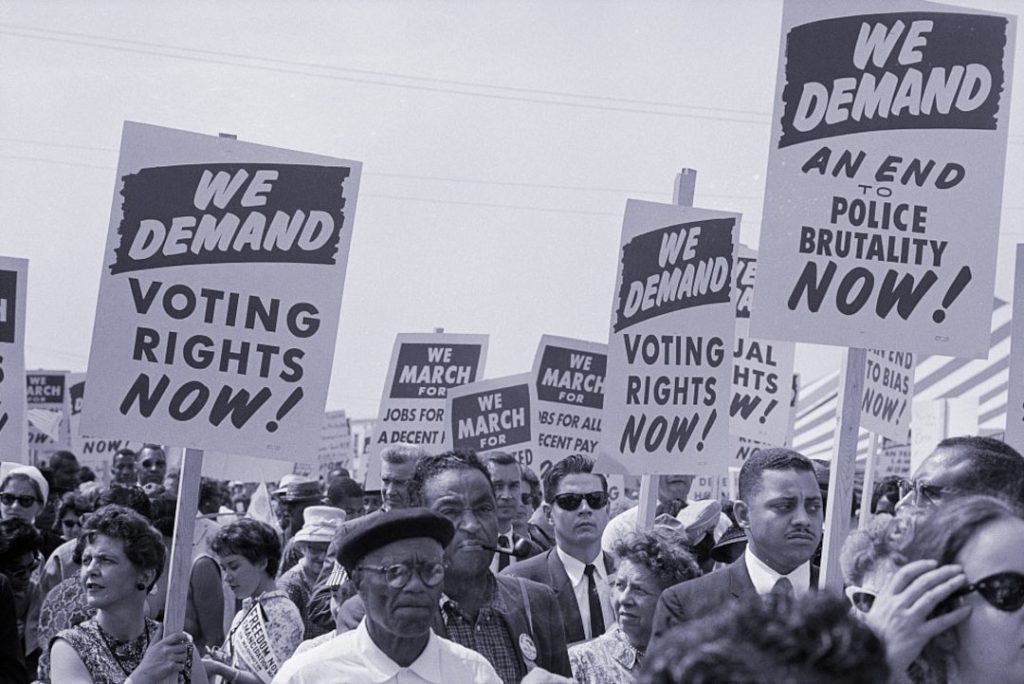President Trump claimed that there was mass voter fraud in 2016, claiming that undocumented immigrants voted in the thousands. This was a lie. In 2020, Trump is essentially telling his supporters to commit voter fraud. He said, “So send [the mail-in ballot]. And then see and then vote and let’s see what happens. You’re now assured, though, that your very precious and important vote has been counted.” He was telling his supporters to first mail a ballot, then vote in person. Voting twice is, in fact, a felony.
Trump’s call to knowingly break the law stands in stark contrast to how the state punishes Black people who unknowingly break undemocratic voting laws. In 2017, after serving a five-year sentence for tax fraud, Crystal Mason began a supervised release. She was only 10 months away from the end of her supervision period when she went to the polls to vote for Hillary Clinton.
She filled out a provisional ballot because her name wasn’t on the rolls. She did not realize that “felons serving any part of their sentence” aren’t allowed to vote. Not only are they barred from voting, but it’s a felony for them to try to vote. Mason didn’t know that, yet she was sentenced to five years in prison for “voting illegally.” She has almost exhausted her ability to appeal and is on her last attempt. If she loses, she’ll be taken to prison.
This kind of suppression is not new, but it is characteristic of the climate created by Trump. He claimed that between three and five million people voted “illegally,” focusing on undocumented immigrants, who he claims cast ballots for Hillary Clinton. He then created a commission to investigate this — a clear message to state governments that they need to crack down on voters. Mason was a casualty of these politics.
Mason’s case, along with those of millions of other Black people, highlight that democracy has been a myth for Black Americans throughout U.S. history. This has intensified under Trump, who explicitly says he wants to suppress the vote. So this year, Democratic Party pundits and liberals are finally wringing their hands about the erosion of democratic rights — something that has been a constant for Black voters throughout U.S. history and is only being exacerbated by the pandemic.
A History of Violent and Lawful Suppression
Jarvious Cotton cannot vote. Like his father, grandfather, great-grandfather, and great-great-grandfather, he has been denied the right to participate in our electoral democracy. Cotton’s family tree tells the story of several generations of black men who were born in the United States but who were denied the most basic freedom that democracy promises — the freedom to vote for those who will make the rules and laws that govern one’s life. Cotton’s great-great-grandfather could not vote as a slave. His great-grandfather was beaten to death by the Ku Klux Klan for attempting to vote. His grandfather was prevented from voting by Klan intimidation. His father was barred from voting by poll taxes and literacy tests. Today, Jarvious Cotton cannot vote because he, like many black men in the United States, has been labeled a felon and is currently on parole.
— Michelle Alexander, The New Jim Crow
There is a long and violent history of barring Black people from the ballot box. During the Reconstruction era, Black voting boomed, and Black people were voted into office, including 20 Black congressmen. But by the end of Reconstruction, the same white oligarchs held the reins of power in the South, using laws, state violence, and KKK terrorism to roll back the rights that Black people had won.
In law, this meant the introduction of policies such as grandfather clauses — laws passed by state legislatures to subvert the Fifteenth Amendment against race-based voter suppression. These rules allowed people who had voted before 1867 the ability to vote without owning property, paying a poll tax, or having to pass “literacy tests” that asked impossible questions well beyond basic literacy. The effect was to ensure the continued right to vote for the white ruling class and the white working class, while creating insurmountable barriers for Black people, inscribing into law the suppression of Black votes. There were also extralegal forms of keeping Black people from the ballot box: the KKK played a key role in barring Black people from voting, terrorizing those who dared to attempt it. This is the legacy of American democracy.
The Voting Rights Act of 1965, a concession made to contain an increasingly radicalized civil rights movement, was meant to address some of these racist laws and ensure the right of Black people to vote, especially in places with a history of racist voting policies. This legislation banned literacy tests and required local governments to obtain federal clearance before making changes to voting rights. But a 2013 decision in Shelby County v. Holder removed the federal oversight component of the law. While this aspect of the Voting Rights Act was a minimal protection, the verdict in Shelby County v. Holder gave a green light to pass even more laws that would disenfranchise Black people. This was followed by predictably racist voting laws.
In the context of the pandemic and broader voter disenfranchisement, Black people who are already broadly disenfranchised are most affected.
Prison Disenfranchisement
As of 2016, U.S. courts incarcerated up to 2.3 million people. The U.S. makes up 5 percent of the world’s population and 25 percent of the prison population. Black people are most targeted by the carceral state, making up only 13 percent of the population but almost half of the prison population. In Michelle Alexander’s book The New Jim Crow, she notes that there are more Black people imprisoned todaythan there were enslaved in 1850. This is because the Thirteenth Amendment includes an exception to the banning of slavery — allowing unpaid labor in the prison system. Massive profits continue to be reaped by prison labor to this day.
Incarcerated people are not only removed from their communities but are also removed from the state’s electoral political processes, for the duration of their sentences and often for long afterward. In every state but Maine and Vermont, people lose their right to vote during their time in prison, and in 21 states, people are unable to vote until their probation or parole is over. In addition to having their voting rights revoked even when released, felons in states like Arizona are expected to pay off outstanding fees before voting rights are returned to them. In 11 states, a person’s right to vote is suspended indefinitely when they receive sentencing. Often it takes a governor’s pardon to be able to vote — something far too exclusive for all but a very small number of convicted people.
Even after leaving the abusive physical institution of prison, and while experiencing the day-to-day struggles of insecure jobs and uncertain housing, people formerly convicted of a crime are still excluded from the most basic right — the ability to vote. There are 6.1 million people in the United States who are disenfranchised due to felony convictions, and about 40 percent of them are Black. This means one in 13 Black people cannot vote due to disenfranchisement, as opposed to one in 56 non-Black voters. It develops and maintains a caste system in which Black people are alienated from their political rights.
“Affirmative Action for White People”: The Senate and Electoral College
Two pillars of the racist voting system are the Electoral College and the Senate, which dilute the Black vote and increase the power of the white vote. Both go back to the very founding of the United States, to the bedrock of the Constitution, which sought to elide “one person, one vote.” James Madison said it himself: “The right of suffrage was much more diffusive in the Northern than the Southern States; and the latter could have no influence in the election on the score of the Negroes. The substitution of electors obviated this difficulty and seemed on the whole to be liable to fewest objections.” It was a way for the South to use the three-fifths compromise to increase its population without increasing the voters.
Today, both the Electoral College and the Senate have a similar effect: overrepresenting white people and underrepresenting Black people and other people of color. In the case of the Electoral College, five of the six states that are over 25 percent Black are Republican states. Most haven’t voted Democrat in more than four decades. This means that the 25 percent of Black people living in those states, who mostly vote Democrat, essentially have no say in the election. The winner-take-all system means that their votes will go to the Republicans.
In the case of the Senate, small states are disproportionately represented … and small states to have fewer Black people. According to an article in Intelligencer, 2.7 million people from the overwhelmingly white states of Wyoming, Vermont, Alaska, and North Dakota have the same number of senators as the 110 million people in California, Texas, Florida, and New York, which have significant numbers of people of color, and Black people more broadly. As a result, David Leonhardt calculated, white people have 0.35 senators per million people, while Black people have 0.26, and Latinos stand at just 0.19. He called it affirmative action for white people.
These two institutions are institutional and systematic mechanisms of Black voter disenfranchisement — two of the most undemocratic systems in U.S. democracy.
Kicking Voters Off the Rolls
The key method used to enforce this disenfranchisement of Black people is their removal from the voting rolls. At least 17 million voters were purged nationwide from 2016 to 2018, disproportionately affecting Black communities. In Wisconsin, the Black voting population is only 5.7 percent of the state’s electorate, yet 35 percent of the voter-purge notices went to the two counties that account for 74.6 percent of Wisconsin’s Black voters. In another example, Georgia secretary of state Biran Kemp put 50,000 voter registrations on hold. Seventy percent of the selected voters were Black people.
This is likely a result of Shelby County v. Holder. A Brennan Center report explains that “approximately 363,000 more voters were erased from the rolls in the first election cycle after Shelby County than in the comparable midterm election cycle immediately preceding it.”
Closing Polling Stations
In a dramatic scene that took place in Kentucky this June, dozens of people, predominantly Black, banged on the doors and windows of the Kentucky Exposition Center, demanding the right to vote. During the June primaries, Kentucky closed 95 percent of polling places, leaving Louisville, the largest city in Kentucky, with just one.
On Super Tuesday, massively long lines were reported in working-class Black communities across the country. CNN correspondent Ed Lavandera tweeted a photo of Hervis Rogers, a Black voter who waited nearly seven hours to cast his vote in Houston. Rogers was finally able to vote at 1:30 a.m. — leaving the polling place late to work for his overnight shift.
It is well known that in wealthy white communities, voting is generally quick and easy, while in Black and working-class neighborhoods, people wait for hours to cast their ballot. Before the pandemic, Texas closed over 400 polling places, Arizona closed over 200, and the states of Louisiana, Alabama, Mississippi, North Carolina, and South Carolina have closed over 250 polling places collectively. Across the South, 1,688 polling places were closed from 2013 to 2019.
Ari Berman, senior writer at Mother Jones magazine, correctly stated, “The long lines are a form of a poll tax, because they keep people from being able to work. They keep people from getting to their kids or their families. … It’s disproportionately hurting Latinos, African Americans, other people, that are already struggling to vote in states like Texas that have other forms of voter suppression, as well.”
Voter ID Laws
Voter ID laws are another means of disqualifying people from the electoral process. As 35 states currently enforce these requirements, voters are subject to a bureaucracy that disproportionately disqualifies people of color from voting in most of the United States.
One study found that almost 10 percent of Black people lack the proper identification for voting in many states. The study also found that Black people are twice as likely as white people to lack the proper identification, making these laws far more suppressive for Black people.
ID requirements disproportionately disenfranchise low-income people, a group in which Black people are disproportionately represented. They often cannot afford to pay the costs required to get an ID, a process that often requires paying for a birth certificate or other documents and requires travel and time off work to obtain paperwork, which many low-income Black people simply can’t afford. Due to their economic situation and the proliferation of voter ID laws in the United states, many Black people are discounted from the electoral process.
Gerrymandering
Gerrymandering is the practice of creating outcomes for voting districts by manipulating district boundaries. Often used to dilute the political power of the opposing party, the group that controls the borders between districts can dilute the power of Black voters. This became exceedingly clear when the files of Thomas Hofeller, a Republican strategist, were released, revealing that he attempted to racially map North Carolina to ensure Republican victories in elections. According to the New Yorker, “Hofeller’s hard drive also retained a map of North Carolina’s 2017 state judicial gerrymander, with an overlay of the black voting-age population by district, suggesting that these maps — which are currently at the center of a protracted legal battle — might also be a racial gerrymander.” Hofeller also had a hand in drawing districts in Texas, Missouri, Virginia, Alabama, Florida, and West Virginia.
These cases have been brought before courts across the country, and they eventually made it to the Supreme Court in Rucho v. Common Cause. In a 5-4 decision, the unelected Supreme Court justices decided that, although racial gerrymandering is “incompatible with democratic principles,” it was beyond the scope of the court’s power to stop it. In other words: gerrymandering is free to continue.
While this may seem to be a problem only with Republicans, a recent ProPublica article argues that Democrats also use gerrymandering to split the votes of communities of color. In an article entitled “Gerrymandering Is Still about Race,” the author reports that Democrats use a “technique, known as ‘cracking’ in map drawers’ argot,” which “often harms minorities, voters who might have greater clout if they were kept in a single district.”
Voting Is a Right
As Donald Trump seeks further voter suppression, socialists should fight for the right to vote and against the suppression of Black people’s basic civil rights. Though not exclusively used against Black communities, voter suppression disproportionately affects them. Countless Black people are disqualified from the voting process due to sanctions placed by the state, either through its punitive carceral role, age-old practices that disenfranchise people of less economic means, or the mapping of neighborhoods to manipulate the direction of votes. Therefore, certain basic demands must be made in order to counteract these forms of state suppression.
These demands would increase the level of democracy available to all voters, not only to the Black people who are disproportionately affected by voter suppression.
- Automatic voter registration for all U.S. residents and Americans living abroad. This includes incarcerated and undocumented people.
- Mail-in voting and extensive availability of voting sites.
- Election Day as a federal holiday, with everyone excused from work.
- An end to racist gerrymandering.
- Abolish the Senate and Electoral College.
Fighting for a Democracy of the Working Class and Oppressed
The right to vote is a basic right of capitalist democracy. The promise of the ability to vote for our leaders was part of the rhetoric of the American Revolution, although it has never been a reality for oppressed people in America. To this day, Black people are systematically disenfranchised from the vote and we should fight for everyone to have this most basic civil right.
However, real democracy means more than the right to vote for Democrats or Republicans on Election Day, since it is in the nature of both of these parties to systematically oppress people, and no one has experienced this oppression more acutely than Black people. As Lenin put it, “To decide once every few years which members of the ruling class is to repress and crush the people through parliament — this is the real essence of bourgeois parliamentarism, not only in parliamentary-constitutional monarchies, but also in the most democratic republics.” This is particularly true for Black Americans, who have been hyperpoliced and imprisoned by both Democrats and Republicans; it is particularly true for the Black communities against which the National Guard was sent by the first Black President to put down the protests insisting that Black Lives Matter. Although we have to defend the basic right to vote for the Black community, the limitations of voting in the U.S. makes this vastly insufficient to make the fundamental changes we need.
Real democracy means that the working class and oppressed can decide all aspects of our lives, from production to reproduction. Real democracy can’t exist in a society based on profits, and racism is central to producing those profits. Capitalism depends on the semi-slave labor of Black people in prisons and the lower wages paid to Black people. Real democracy can’t exist when Black people, and the working class as a whole, have no say in the functioning of the economy, but are allowed to vote for an executive oppressor every four years. In this sense, only socialism — a system in which the working class and oppressed democratically decide on every aspect of society — can be a real democracy.












